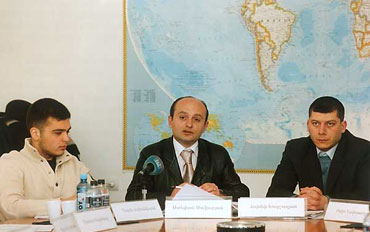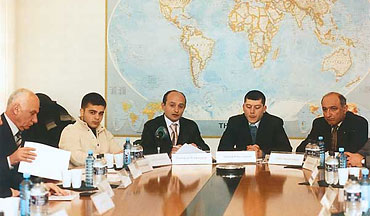| |
February 15, 2007
ACNIS Examines International Views on Upcoming Parliamentary Elections
Yerevan—The Armenian Center for National and International Studies (ACNIS) today commenced its 2007 seminar series with a policy roundtable entitled “Armenia’s Parliamentary Elections and the Statements of the International Community.” The meeting brought together members of Armenia’s political establishment, leading analysts, policy specialists, political scientists, and media representatives.

ACNIS senior analyst Hovsep Khurshudian greeted the audience with opening remarks. “The international press has been paying considerable attention to Armenia in the recent months,” he said. “It behooves us to evaluate its message in light of domestic political developments.”
In his address, ACNIS director of research Stepan Safarian reflected on this message. He noted that the international community, having resolved to settle various geopolitical matters, would pay special attention to Armenia’s pre-election processes. After reading out some of the international community’s pronouncements to the Armenian political arena, Safarian proceeded to separate them into three categories: those relating to the Karabagh conflict, those relating to Armenia-Turkey relations, and those relating to Armenia-NATO relations. In his view, these messages are addressed primarily to the authorities of Armenia with the goal of soliciting their positions and gauging Armenia’s policy on the eve of republic-wide elections. “The purpose of the message, delivered internationally in the form of diplomatic announcements and publications by influential news media, is to bridge the gap between the international community and those who are preparing to form a government in Armenia,” Safarian argued. 
Boris Navasardian, chairman of the Yerevan Press Club, spoke next, focusing on the projected reactions of international bodies to the forthcoming elections. It is highly unlikely, he asserted, that the West and its many institutions will intervene in a potentially fraudulent election process in Armenia. According to Navasardian, the world’s four major power centers—regional intergovernmental organizations, the European Union, the United States, and international NGOs—are disposed neither to interfere in the electoral processes in the country nor to prevent or condemn election fraud. “Placing our hopes on the outside world, therefore, is pointless,” Navasardian said. “Instead, we ought to dig deep into our internal resources.” He added that beyond its hope for a stable and predictable Armenia, Europe is unconcerned with the nation’s politics.

Participants in the ensuing discussion included Felix Khachatrian of the Central Election Commission; Yerevan State University lecturer Sasun Saribekian; political analyst Gevorg Altunian of the Armenia Television Company; analyst Vakhtang Siradeghian of the Center for Regional Development; Edward Antinian, deputy chairman of the Liberal Progressive Party; ACNIS director of administration Karapet Kalenchian; analyst Marine Karapetian of the Concord Center for Legal and Political Studies; and Zhanna Aleksanian of Human Rights Watch.
Founded in 1994 by Armenia’s first Minister of Foreign Affairs Raffi K. Hovannisian and supported by a global network of contributors, ACNIS serves as a link between innovative scholarship and the public policy challenges facing Armenia and the Armenian people in the post-Soviet world. It also aspires to be a catalyst for creative, strategic thinking and a wider understanding of the new global environment. In 2006, the Center focuses primarily on civic education, democratic development, conflict resolution, and applied research on critical domestic and foreign policy issues for the state and the nation.
For further information on the Center call (37410)
52-87-80 or 27-48-18; fax (37410) 52-48-46; email root@acnis.am or info@acnis.am
|
|





